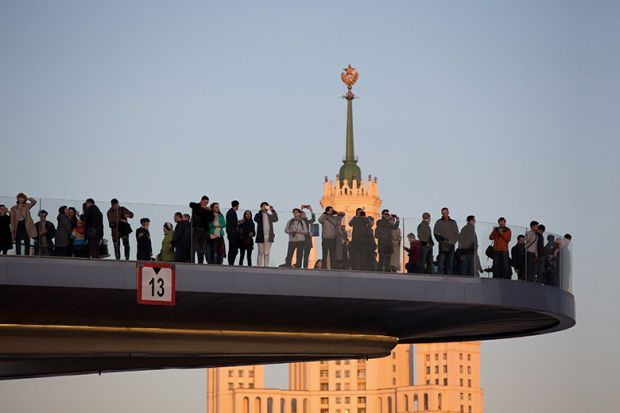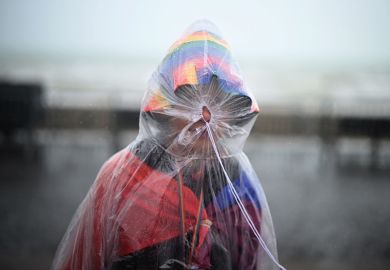For centuries, Westerners have looked at Russia and felt, for the most part, either superior or afraid. In this exciting and provocative book, Mark B. Smith blows apart misconceptions about the Russian past which have propped up what he has termed “The Russia Anxiety”. Much more than straightforward Russophobia, he argues, this anxiety is a historic syndrome that rotates between three sets of symptoms: fear of Russia, disregard of Russia and contempt for Russia. While other places have remained immune, western European countries and the United States suffer from spells of the Anxiety, although the symptoms switch about and are sometimes alleviated temporarily.
Holding a mirror up to uncomfortable home truths about the fairy tale of liberal democratic progress in the West, while illuminating the multilayered nature of Russia’s past to expose the oversimplification that has dominated the popular imagination, Smith implores us to remove the lenses that frame Russia as alien, malign and, worst of all, a poor learner: the errant, incorrigible pupil in the Western classroom of historical progress who could/should have followed the “correct” course but “failed” because tyranny was in its DNA.
It is not Smith’s aim to “let Russia off the hook” as an innocent party in either domestic or foreign affairs. At various points, he acknowledges how Russia’s neighbours in its “near abroad” have well-grounded concerns about Russian aggression, that mass violence under Stalin was “one of the most terrible phenomena in human history” and that there was a need for answers over Salisbury in 2018. His point is that the West’s “Anxiety”, although not entirely groundless, is based in exaggeration and misunderstanding which leads to an alarmist hysteria that can be unhelpful and even dangerous.
The structure of the book is somewhat complex, but Smith’s energy and dynamism carry the day. First, he sets out the emergence of “the Russia Anxiety”, tracing its origins back to the 16th century, when Europeans started to travel eastwards towards Muscovy and the Western gaze fell upon Russia. Perceiving political, social and cultural differences, observers characterised them negatively and the familiar picture of a “rude and barbarous kingdom” began to take shape in the European imagination. It was elaborated by successive commentators, including the early 19th-century Frenchman, the Marquis de Custine, of whom Smith provides a wonderfully sparkling vignette to contextualise the hostile account he produced.
He then turns to “the Black Legend” at the heart of “the Russia Anxiety” – the “myth of Russia’s special, undeviating path to misery...the idea that centuries of oppression have created a servile population forever fated to be hoodwinked by a tyrant” – and makes it his mission to expose how superficial and one-dimensional such views of Russian history are. His more nuanced position is that authoritarianism in Russia, from serfdom to Soviet socialism, was never as simple as a population of passive victims in the grip of unbridled tyranny and repression. Indeed, these systems were based upon forms of mutual obligation, expectations of responsiveness of rulers to economic needs, opportunities for participation and redress, and space for evasion (or creative misunderstanding) of top-down control. Such claims are very familiar to specialists, but perhaps more difficult to stomach for a mainstream audience. While the “totalitarian” paradigm has been largely revised out of existence in current scholarship, Smith’s multifaceted interpretation has hardly made an impression in popular understandings of Russian history – and those scholars who dared to make the case have sometimes been labelled apologists for one leader or another.
Smith goes on to construct an alternative narrative of Russian history which corrects the excesses of “the Black Legend” and in part three explores five of the Anxiety’s flashpoints – the issues of democracy, violence, the West, expansionism and war – employing detailed context and a comparative approach to reveal that the exaggerated binary distinctions between morally upstanding European liberty and evil, solely repressive Muscovite, Russian or Soviet tyranny and servility are misleading. For Smith, the main difference was that contingency and circumstance undermined Russia’s prospects for democratic development.
In a fascinating chapter on “The Dictatorship Deception”, he sketches a complex picture of “democratic strains” within Russian authoritarianism in its various forms, from Rus to the Revolution and beyond, where “amid the long development of autocracy, the Russian lands underwent various experiments in limited constitutionalism and democratic participation”, even if these did not always resemble Western representative models. Smith also squeezes all the juice he can from the rare fruits of Russia’s historical liberalism. Here is a more positive overview of this subject than you are likely to read anywhere else, perhaps stretching it in places, yet it is an analysis firmly grounded in a sensible handling of the scholarly literature.
In the same week that pro-democracy protests with tens of thousands of people rumbled on in the streets of Moscow, British politicians remonstrated that the prime minister might suspend the Commons, as indeed he now has done, proroguing Parliament to force through Brexit. It is clear that Smith’s book offers much food for thought. Today, Russia’s capital has a significant pro-democracy movement, which demands that Putin’s regime observe legality and compete for power in fair elections. They may face a long struggle, with the outcome partly dependent on how the current wave of far-right populism plays out in the West, but what Smith offers them is a more positive view of Russia’s liberal and democratic past which opens up the prospect of a more optimistic view of its future.
For us in the West, he adds some sage advice on how we might better aid the progress of genuine democracy both at home and in Russia. So far, since the collapse of the USSR, the West has done a terrible job of supporting Russia’s democratic transition and peaceful integration into European institutions, instead expanding Nato, intervening militarily to topple governments outside of international law and playing its part in stoking a new Cold War. It is time to discard both the cultural prejudices that paint Russians as possessing some inborn propensity to servility under dictatorial rulers and to pursue critical self-reflection rather than the self-righteous backslapping of Western liberalism that has led it to patronise and “other” the Russians. This contributes to a hostile international atmosphere which only plays into Putin’s hands in convincing the Russian people of the fortress mentality that is part of his appeal.
Lara Douds is the vice chancellor’s research fellow in history at Northumbria University and co-editor of the forthcoming The Fate of the Bolshevik Revolution: Illiberal Liberation, 1917-41.
The Russia Anxiety: And How History Can Resolve It
By Mark B. Smith
Allen Lane
480pp, £25.00
ISBN 9780241312766
Published 4 July 2019
The author
Mark B. Smith, university lecturer in 20th-century European history at the University of Cambridge, studied history at Oxford and then at UCL’s School of Slavonic and East European Studies. His teachers there, he recalls, were “major historians
of Russia – Geoffrey Hosking, Lindsey Hughes and Susan Morrissey”, while he “also learned a lot from Russia specialists in different disciplines. As supervisor and mentor, Hosking has given me a model of how to write in a broad and ambitious way about Russian history, though I don’t claim to have lived up to it!”
An expert on life in the USSR, Smith has written on cities, class and the Soviet “welfare state”, as well as the monograph Property of Communists: The Urban Housing Program from Stalin to Khrushchev (2010). But he has become “very worried
that we’d lost control of how we talk about Russia, potentially with disastrous results. My response was to put aside my narrower research into Soviet history and to write a chronologically and thematically wide-ranging book about the West’s historic ‘Russia problem’ and the ways that history has normalised Russia rather than made it a hopeless aberration. In this sense, the same big question unites all my research: where do Russian and Soviet examples fit into our wider European and global histories?”
Asked about what it would mean if the West was able to overcome its Russia Anxiety, Smith admits that his “book has a viewpoint – I think that Europe would be more secure if the Russia Anxiety diminished”. Yet what he “really want[s] is for readers to make up their own minds. A truly critical and open-minded sense of the past and its possible relationship to the present is the opposite mentality to that which sustains the Russia Anxiety.”
Matthew Reisz
POSTSCRIPT:
Print headline: A world of exaggeration
Register to continue
Why register?
- Registration is free and only takes a moment
- Once registered, you can read 3 articles a month
- Sign up for our newsletter
Subscribe
Or subscribe for unlimited access to:
- Unlimited access to news, views, insights & reviews
- Digital editions
- Digital access to THE’s university and college rankings analysis
Already registered or a current subscriber? Login








